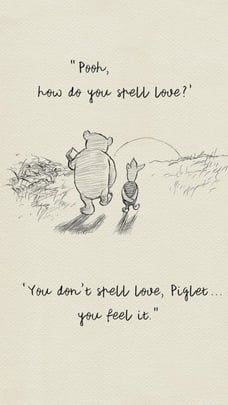“How do you spell love” asked Piglet?
“You don’t spell it” said Pooh, “you feel it”

This is one of my favourite Winne the Pooh quotes, and today being Winnie the Pooh day, I thought I would share my thoughts on the feeling of love. Now don’t worry, I’m not about to get all Mills & Boon or 50 shades, I want to talk about ‘professional love’.
The term ‘professional love’ was coined by Dr Jools Page, who conducted a research project in 2012, talking to Early Years professionals across England. Dr Page and her team wanted to research the impact of media coverage around sex abuse scandals on the relationships with children and early years professional. The research aimed to understand how professionals felt about ‘loving’ children in a professional capacity.
I’ve seen many a debate over the years about where the line is drawn when it comes to the love and affection we show the children in our care. One of the most discussed questions on this topic is how we should respond when a child says ‘I love you’. Should the word love be used between early years practitioners and children and ultimately, should practitioners tell a child ‘I love you too’?
It’s a grey area, with so many arguments and perspectives both from early years practitioners themselves and from parents and families.

As professionals in the sector, we understand the importance of strong attachments to key care givers, and the EYFS reminds us that attachments shape a child’s social world and underpins children’s personal development. Knowing that attachments with care givers is so essential to a child’s holistic development, confidence and sense of self, we may ask if love part of this attachment process? If it is, is it ok to express these feelings as love? The challenge faced by many practitioners is how to effectively and professionally convey the affectionate, loving and caring behaviours needed in the role of key person.
Dr Page shared the results of her research, which was completed by 793 early years professionals, including nursery staff, childminders and teaching assistants;
- 95% felt that showing affection to the children in their care was an important part of early years practice
- 10 % said they were worried about false accusations and how others view the appropriateness of their actions.
- There was mixed opinions on whether respondents felt comfortable being alone around the children in their care, with one in five saying they avoid this
- Respondents offered a varied and wide ranging definition of ‘professional love’, including broad terms like ‘care’ and ‘kindness’ or being ‘available’ and paying ‘attention’ to the children.
- Physical contact, such as kissing and hugging was mentioned in some definitions, with discourse regarding acceptable and unacceptable actions, with a small number suggesting that displays of affection in general must be initiated by the child.
- 56 % said they weren’t concerned about parents’ attitudes to professional love,
- 22% felt they were acting in line with what parents want for their children
- In response to a child saying ‘I love you’, nearly half said they would say ‘I love you’ back.
The results are hardly surprising, and perhaps we might see a difference in response If we asked parents the same questions. So how do we ensure the voice of the parent is taken into account when we decide on the boundaries and definitions of professional love? Questionnaires maybe? Parent feedback? No doubt the answers will be as unique as the children and families themselves.
Dr Page described professional love as a reciprocal relationship which some practitioners might establish with babies and young children. It’s impossible to love a child in the way a parent would, and professional love doesn’t seek to build that type of bond. Professional love shown by an early years professional should complement the relationship a child has with their parents or carer.
Dr Page stated, “I have learned that early years practitioners have strong feelings about the children for whom they are responsible. The important thing is being able to talk about these emotionally laden feelings with a manager or supervisor, and that requires thoughtful leadership and a culture of planning a safe, regular and respectful space to talk about complex issues such as professional love.”
In the fluid and ever changing world that is early years, do we need to label the ‘love’ that we show children in our care everyday? A child who feels welcomed each day, part of their nursery family, held in mind, safe, secure, confident and respected will no doubt feel the love in the setting.
However, it is important to remember that not all children will experience loving, secure attachments with their parent or carer. Some children might need a different approach from early years practitioners, such as safe space, a warm and protected place where their emotional and physical needs are met.
What’s more, early years practitioners, will all have their own varied and unique experiences of love, which may impact the way in which they express and offer professional love.
So, as pooh quite rightly says, you can’t spell love, you feel it, and the children in our care have the right to feel loved every single day. How you create that is down to each individual child and setting, however, creating a loving environment will enable children to thrive and surely that what we all want?
Happy Winnie the Pooh Day!
